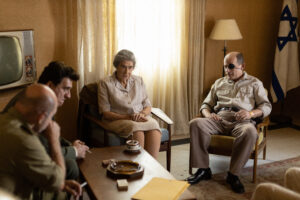It’s not every movie in which the word “hubris” sneaks into the forward. To be clear, it wasn’t misplaced. The film Golda has a fairly solid command of the events taking place surrounding the Yom Kippur War. In fairness, due to the “failings” and “hubris” shown by the Israeli elite, the 1973 Arab-Israeli conflict lasted almost FOUR TIMES AS LONG as the Six-Day War, truly showing a huge intelligence gaffe, for which Israel’s Prime Minister Golda Meir (Helen Mirren) had to answer to the Agranat Commission. It’s kind of like defending your thesis, only failure might result in execution for treason.
It occurs to me that some of my readers might not get the context of Golda. Let me see if I can sum it up as I understand it: During WWII, Hitler and his Nazi pals rounded up and killed six million European Jews. Upon learning this, some folks were outraged enough to create a national Jewish homeland. In 1948, a key section of the Middle East was carved out and became Israel. Israel’s new Arab neighbors all went “WTF?!” and before long, there was war. Fast forward to the last 1960s. Israel as a nation can be described in many, many ways, but not necessarily as a state of assholes, for when *gasp* a woman rose to power, she was not immediately thwarted and replaced by a racist, narcissistic game show host as some nations might do, but I’m not naming names.
Golda Meir had terrible feet and smoked like a chimney that was also a chain smoker. Seriously, the only times in the film that Golda Meir doesn’t have a cigarette in her mouth is when she’s asleep … and even then … while the woman was dying of lymphoma, she smoked in between oxygen mask pulls. Golda Meir was also extremely intelligent, commanding, and shrewd. She is exactly the kind of leader you want in war, because she had a combination of fearlessness and an ability to own mistakes that I find lacking in, quite literally, every current elected member of the GOP.
In 1967, Israel defeated a coalition of Egypt, Syria, and Jordan in six days. Freaking beat that, world. However, the movie intro tells us that -as a result- Israel became a little too big for its britches, if youknowwhatI’msayin’. Hence, when similar enemy forces amassed once again in 1973, Israel was not as prepared to repel the Arab aggressors as they could have been. Golda Meir was PM at the time and had to answer for the lack of adequate preparation.
Well, it’s not like Israel didn’t see it coming … and it’s not like they were powerless. Israel simply didn’t anticipate the timing. The Agranat would later conclude that Israel was too complacent based on false assumptions; the film implied that there was a technical innovation that went unused. Neither of these points were spelled out as clearly as the viewer might like. Oh, we get the idea that the Israeli elite were pissed off about the early returns, but the exact “failures” were highlighted in one (1) joint chiefs of staff scene. The tech stuff was a rumored afterthought and (I assume) never followed up. The film followed Golda around hither and thither, watching her chain smoke and negotiate with, literally, everybody. It probably wasn’t easy to be Golda Meir. My guess is she’d have a drug habit if she didn’t have a smoking habit.
timing. The Agranat would later conclude that Israel was too complacent based on false assumptions; the film implied that there was a technical innovation that went unused. Neither of these points were spelled out as clearly as the viewer might like. Oh, we get the idea that the Israeli elite were pissed off about the early returns, but the exact “failures” were highlighted in one (1) joint chiefs of staff scene. The tech stuff was a rumored afterthought and (I assume) never followed up. The film followed Golda around hither and thither, watching her chain smoke and negotiate with, literally, everybody. It probably wasn’t easy to be Golda Meir. My guess is she’d have a drug habit if she didn’t have a smoking habit.
You can tell what this film wants to be. Director Guy Nattiv wanted the slice-of-war biopic we saw in films like Lincoln and Darkest Hour. Those films won Oscars, respectively, for Daniel Day-Lewis and Gary Oldman; surely Helen Mirren’s work was just as good here, right? And, indeed, Mirren and the makeup department both deserve credit here. Helen Mirren IS Golda Meir. The problem with that comparison is the films dwells too long on Meir and it does so because unlike Lincoln or Darkest Hour, there is no “higher cause” here. The Yom Kippur War is simply about the existence of the state of Israel, which is a damn high cause if you’re an Israeli, but it was never really in doubt and isn’t about the end of modern slavery and it isn’t about the fall of the western world. And Helen Mirren may well have been the embodiment of Golda Meir, but Golda Meir in October of 1973 was little more than a chain-smoking statewoman. Give Mirren all the credit in the world for depicting a person fighting for both and national survival, but in a film literally about war, the most notable scene shouldn’t be a woman spitting blood at a mirror. Heck, the #2 person in the film isn’t even in the war; it’s Henry Kissinger (Liev Schreiber). For the subject matter, Golda is frightfully dull; only Mirren’s performance keeps one from nodding off. Thankfully, both the war and this war film were both very short, compared to most.
The once was an Israeli P.M.
Who had aggressive neighbors to condemn
This hard-nosed Israeli
Chain-smoked almost daily
And then coughed up much more than phlegm
Rated PG-13, 100 Minutes
Director: Guy Nattiv
Writer: Nicholas Martin
Genre: Gimme that nom!
Type of being most likely to enjoy this film: Historians
Type of being least likely to enjoy this film: I imagine Egyptians who lived through the time before Sadat



